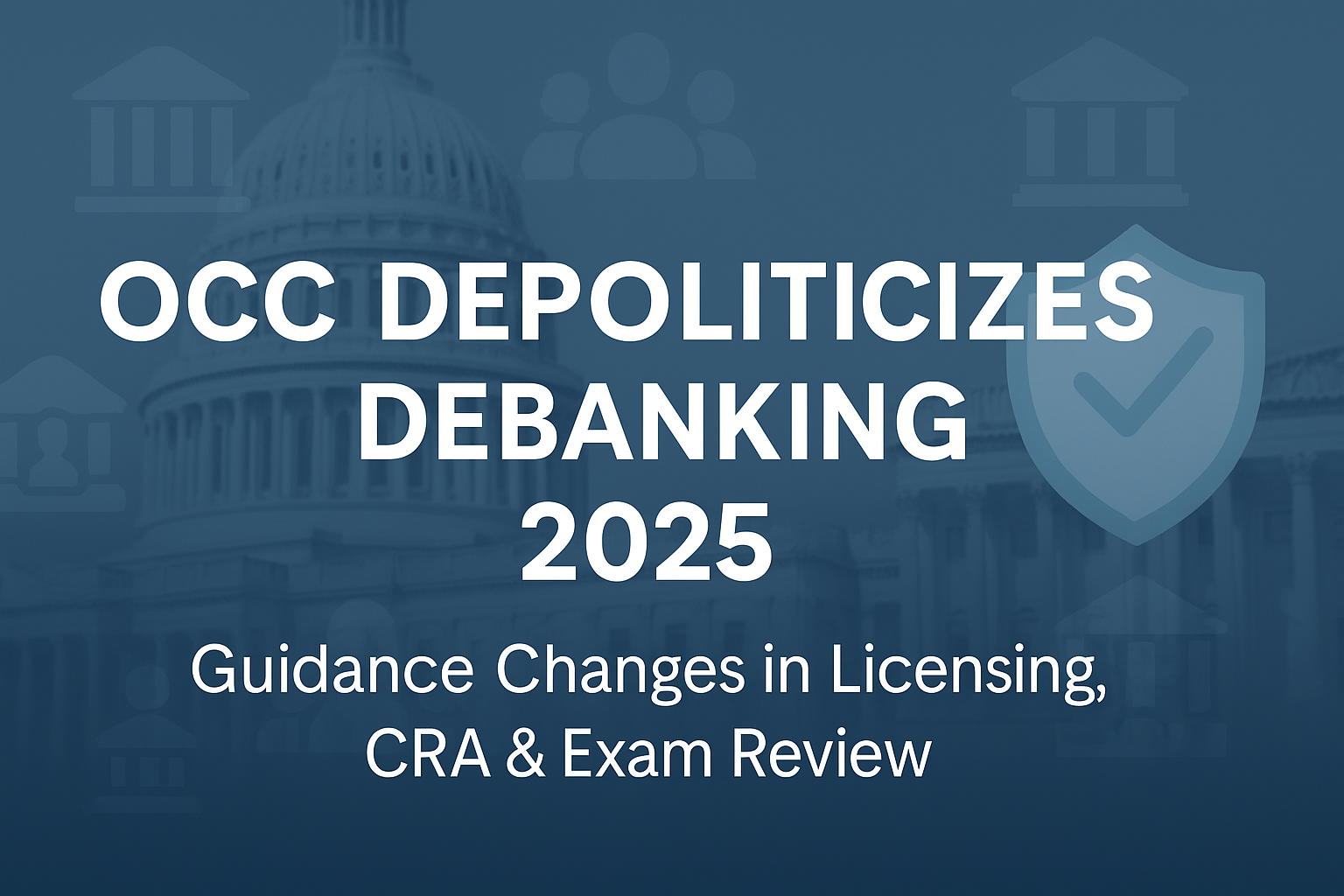In early September, the Office of the Comptroller of the Currency (OCC) publicly announced actions to root out “politicized or unlawful debanking,” consistent with the Administration’s executive order on “Fair Banking.” This is a critical moment for banks to understand how examination guidance, licensing, and CRA assessments may shift. OCC.gov
This ties into your earlier posts on reputation risk removal and exam scaling—making it a logical, timely addition for September backfilling.
OCC Moves to Depoliticize Debanking — What Banks Must Know
In early September 2025, the Office of the Comptroller of the Currency (OCC) took a concrete step to align banks with the Fair Banking Executive Order, issuing new directives aimed at eliminating politicized or unlawful debanking within the federal banking system.
Comptroller Jonathan Gould emphasized that banks should no longer be evaluated or penalized for account closures or service refusals based on customers’ political or religious beliefs, or otherwise lawfully conducted business. The OCC is revising its licensing and CRA evaluation procedures to ensure “individualized, objective, and risk-based” decisions.
This move represents more than symbolic alignment with the Executive Order—it signals a shift in how examiners may review policies, monitor complaints, and assess bank risk practices. Below, we break down what changed, what to watch, and how banks should respond.
What the OCC Announcement Changes
| Directive | What It Changes | Bank Implication |
|---|---|---|
| Licensing & performance evaluation | Licenses and CRA ratings must consider a bank’s policies around debanking history. If prior accounts were closed for politically influenced reasons, that may impact future approvals. | Banks should revisit account closure practices, documentation, and consistency. |
| Complaint oversight & reporting | The OCC updated its customer complaint portal and will incorporate complaint data into reviews of banks’ policies. | Ensure your complaint handling, logs, and audit trails are robust and defensible. |
| Review of largest banks’ debanking practices | OCC has initially asked its nine largest institutions for detailed information about their debanking policies and actions. | Large institutions in particular should expect deeper review and proactive readiness. |
| CRA & public interest factors | The OCC will factor compliance with non-discrimination and non-politicized banking into CRA and licensing assessments. | Banks will need to ensure community services, inclusion, and fair access practices are transparent and documented. |
| Revisiting BSA/AML linkages | The OCC is reviewing whether its BSA/AML oversight inadvertently contributes to unlawful debanking practices, and may adjust supervision accordingly. | Risk teams should review internal connection between AML enforcement actions and customer exclusion. |
Why This Matters Now
- Regulators are aligning across fronts: this is a further step following the Executive Order removing “reputation risk” from exam guidance.
- Risk of retrospective review: past account closure decisions may now be revisited, especially where the rationale was weak or undocumented.
- License & CRA stakes are higher: banks with restrictive account policies could face negative impacts on their future expansion or CRA scores.
- Examiners’ lens is sharpening: banks should expect more scrutiny of policy consistency, documentation, and evidence of objective risk assessments.
Strategic Takeaways: What Banks Should Do
Conduct a debanking policy audit
- Review all historical account closures and service terminations in recent years.
- Assess whether decisions were defensible under risk-based criteria—not subjective reputational judgments.
- Document the rationale, escalation, decision makers, and supporting data.
Strengthen complaint systems & remediation
- Ensure your customer complaints system is resilient, traceable, and integrated with compliance oversight.
- Create remediation or appeal pathways for accounts closed under opaque reasoning.
Update licensing & CRA narratives
- Prepare narratives for licensing submissions and CRA evaluations that transparently reflect policy changes, prior practices, and responsive adjustments.
- Emphasize civil rights, inclusion, and nondiscrimination compliance.
Rebalance AML/BSA and exclusion linkages
- Review whether AML or SAR decisions have led to exclusionary or de-risking actions beyond necessity.
- Ensure that any account termination for suspected illicit behavior is clearly supported by evidence.
Train front-line & compliance staff
- Refresh training for branch, onboarding, compliance, and risk teams on the new guidance.
- Emphasize that decisions must be objective, data-driven, documented, and free from non-risk bias.
Monitor complaint data disclosures & OCC reviews
- Expect the OCC to reference third-party, customer, or public complaint data.
- Be proactive in monitoring trends and handling escalations early.
In Context: How This Fits the Regulatory Arc
- This move directly follows the Fair Banking Executive Order and follows your prior blog themes of reputation risk removal and exam scaling.
- In Gibson Dunn’s September 2025 regulatory review, the OCC was already flagged as reshaping its supervision, revisiting guidance around “unsafe or unsound practices,” and recalibrating how chartering and licensing are approached. Gibson Dunn
- Combined with the scaling back of non-core exams, this action signals a sharper regulatory focus: more direct, objective enforcement in key areas and less tolerance for policy ambiguity.
How Saturn Partners Can Help
We can help banks navigate this transition without misstep. Our advisory services include:
- Debanking policy gap analysis & remediation planning
- CRA, licensing, and exam narrative coaching
- Complaint system design and escalation frameworks
- AML / exclusion policy harmonization
- Staff training, audit readiness, and supervisory simulation
Want to review your historical debanking exposures and build your defensible policies? Let’s get ahead of exam scrutiny together. Contact us today!

